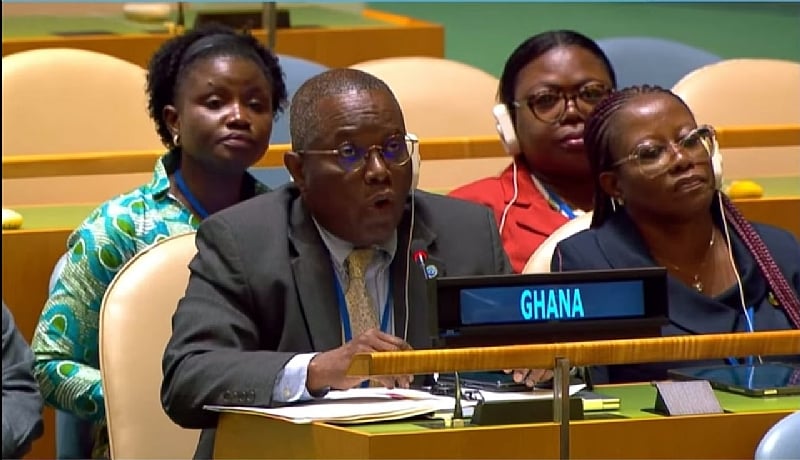Dr. Nii Moi Thompson, Chairman of Ghana’s National Development Planning Commission (NDPC), delivered a compelling address at the 2025 UN High-Level Political Forum (HLPF) in New York, challenging conventional approaches to development aid and advocating for a global productivity revolution. He argued that simply increasing financial assistance to less-developed nations would not suffice to bridge the economic chasm between them and their wealthier counterparts. Instead, he stressed the critical importance of focusing on productivity enhancements as a primary driver of sustainable and equitable growth. His presentation highlighted Ghana’s own initiatives in fostering innovation and productivity, offering them as a potential model for other nations grappling with similar development challenges. Dr. Thompson’s message underscored the need for a paradigm shift in development thinking, moving away from a reliance on aid towards a focus on empowering nations to generate wealth through increased efficiency and innovation.
Central to Dr. Thompson’s address was the unveiling of Ghana’s ambitious $1 billion Innovation Hub. This initiative represents a substantial investment in the nation’s future, aiming to bolster education, healthcare, and human resource development. By placing innovation at the core of its development strategy, Ghana seeks to cultivate a dynamic and competitive economy capable of generating sustainable prosperity. The Innovation Hub epitomizes the nation’s commitment to moving beyond mere financial assistance and embracing a more proactive, internally driven approach to development. It represents a strategic investment in human capital and technological advancement, recognizing that these are the true engines of long-term economic growth and societal well-being.
Beyond the specifics of Ghana’s Innovation Hub, Dr. Thompson’s remarks emphasized the broader need for a global productivity revolution. He argued that closing the economic gap between rich and poor nations requires more than simply increasing financial aid. He highlighted the significant disparity in productivity levels between developed and developing countries, asserting that this gap represents a major obstacle to global economic equality. Dr. Thompson called for a concerted international effort to address this productivity disparity, urging nations to share best practices and collaborate on strategies to enhance efficiency and innovation across all sectors. His call to action underscored the importance of a collective approach to fostering a more equitable and prosperous global economy.
In emphasizing the importance of productivity, Dr. Thompson also addressed Ghana’s efforts to reform its tax system. He stressed the need for fairness and inclusivity in tax policies, ensuring that the burden does not disproportionately fall on the poor. This commitment to equitable taxation reflects Ghana’s broader development philosophy, which prioritizes inclusive growth and shared prosperity. By creating a fair and efficient tax system, Ghana aims to generate the necessary resources to fund crucial public services and investments in human capital, while simultaneously ensuring that the burden of taxation is distributed equitably. This approach recognizes the interconnectedness of economic policy and social justice, ensuring that development benefits all segments of society.
Further solidifying Ghana’s commitment to productivity enhancement, Dr. Thompson announced the establishment of a national partnership aimed at driving productivity gains across both the public and private sectors. This initiative demonstrates the nation’s recognition that productivity growth requires a concerted effort from all stakeholders, including government, businesses, and civil society. By fostering collaboration and knowledge sharing between these different sectors, Ghana aims to create a synergistic environment conducive to innovation and efficiency gains. This national partnership underscores the importance of a holistic approach to productivity enhancement, recognizing that sustainable growth requires a coordinated effort across all levels of society.
Finally, Dr. Thompson extended an offer to share Ghana’s strategies and experiences with the international community, demonstrating a commitment to global collaboration and shared learning. This gesture reflects Ghana’s belief that development challenges are best addressed through collective action and the exchange of best practices. By sharing its own experiences and insights, Ghana aims to contribute to the broader global effort to promote sustainable development and enhance productivity worldwide. This spirit of cooperation and knowledge sharing underscores the importance of international partnerships in addressing complex global challenges and achieving shared prosperity. Dr. Thompson’s presentation at the HLPF served not only as a showcase of Ghana’s own ambitious development initiatives but also as a call for a global paradigm shift in development thinking, placing productivity and innovation at the forefront of the global development agenda.


